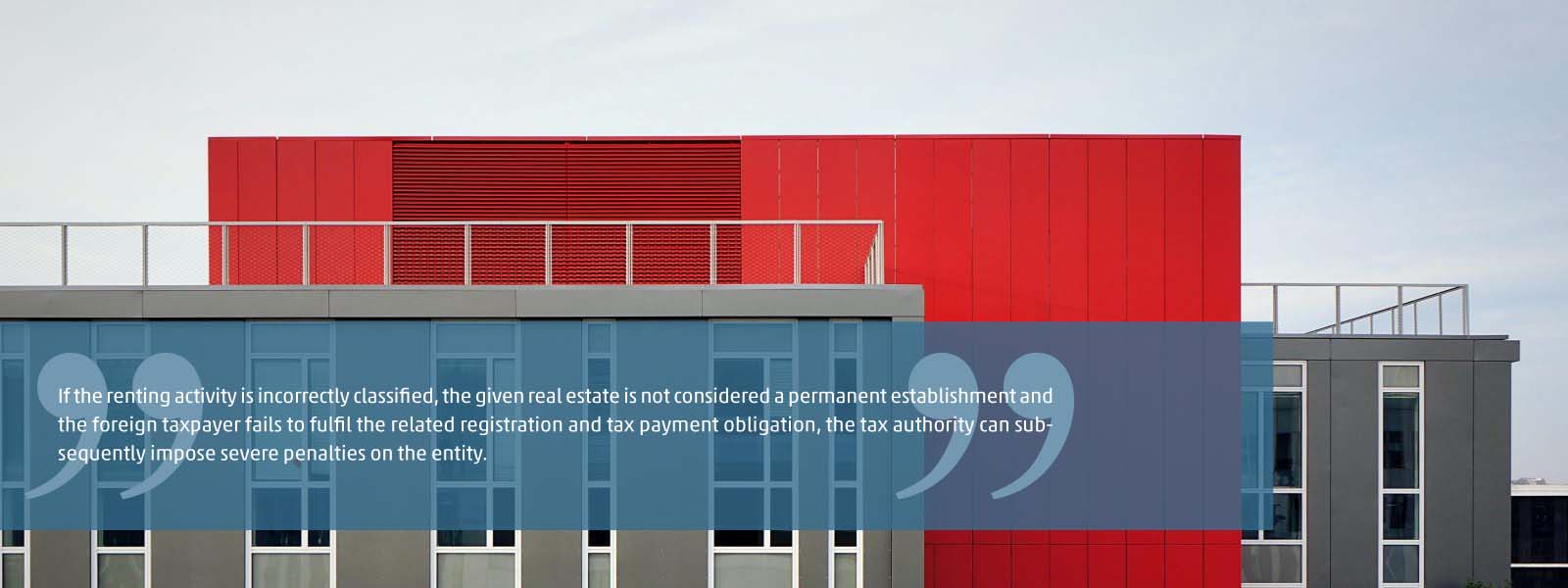It is often the case that renting out real estate involves more than one country, or more precisely, that a company wants to make some use of real estate in a country other than the one where it carries out its business activities. In such cases, the following issues may be of concern:
- In which country do you need to pay taxes on the revenue generated from using real estate located abroad?
- What tax obligations arise?
- Is a permanent establishment created for the lessor company in the country where the real estate is located?
We will answer these questions in our article, and highlight what a foreign company should pay attention to if it plans on renting out real estate located in Hungary.
VAT fixed establishment when renting out real estate
Renting out real estate in a country other than where the company carries out business activities, or using such property, does not necessarily create a VAT fixed establishment for the lessor.
In one of our earlier articles we explained the definition of a fixed establishment in detail based on the Hungarian Act on VAT and the implementing regulation of the VAT Directive. Pursuant to the directive, a fixed establishment is created for a company using real estate in the state the property is located if it has a geographically defined place at a fixed location where it carries out the business activity for a prolonged period, and where all the material and personnel conditions required to conduct the business activity independently are actually available on site. According to the implementing regulation of the VAT Directive, a fixed establishment is created if the service provider possesses a suitable organisation with a sufficient degree of permanence in terms of human and material resources to enable the provision of the services in the state where the real estate is located.
Based on the two rules, it is clear that in addition to the fact the rented out property is located in Hungary, the presence of the human resources and material conditions required for supplying services in the country of the real estate must be investigated further.
One important aspect is to what extent is renting out real estate a determining part of the lessor’s business activity, and does it in fact have the organisational framework enabling the supply of services connected to use of the real estate. If a detailed investigation finds that the above conditions are not met, no fixed establishment is created for the lessor foreign company in Hungary.
However, given that renting out real estate qualifies as a service related to real estate according to the implementing regulation of the VAT Directive, where the place of performance is the country the real estate is located in, then as a general rule, the value added tax incurred must also be paid in the country of the real estate. So for lack of a fixed establishment, the foreign lessor is only exempted from the obligation to register for VAT and pay VAT in Hungary if the lessee is a Hungarian taxpayer to whom the foreign company can issue an invoice subject to the rules on reverse charging.
If, however, the foreign company sets up a permanent establishment in Hungary as a result of renting out real estate, the foreign taxpayer must register and fulfil its tax payment liability in Hungary under the general rules. This entails substantial additional administration.
What about corporate tax?
While – from a VAT perspective – more careful consideration is required to determine whether renting out real estate gives rise to a fixed establishment, for corporate tax purposes the situation for taxpayers is relatively easier.
When assessing the creation of a corporate tax permanent establishment, both the provisions of the Act on Corporate Tax and the convention on avoiding double taxation concluded with the country of the foreign taxpayer must be examined.
Under the conventions on avoiding double taxation, revenue from real estate is generally taxable in the country where the real estate is located. Pursuant to Hungarian legislation, using real estate, transferring or selling rights and concessions in relation to real estate in exchange for compensation, as well as the in-kind contribution and sale of real estate create a permanent establishment.
From the combined interpretation of the above legislation, if a leased property is situated in Hungary, a permanent establishment is created for corporate tax purposes for the foreign lessor in Hungary, irrespective of the duration of the rental. The corporate tax must be paid in compliance with the Hungarian legislation, for which the taxpayer must register in Hungary.
Local business tax in brief
Given that used (rented out or leased) property, among other things, is considered a permanent establishment under the Act on Local Taxes, a permanent establishment is created for the foreign taxpayer in Hungary upon renting out real estate, so it is obligated to pay local business tax.
As revealed by our article, it is highly important to thoroughly investigate the renting activity if a company decides on renting out real estate located in a country other than where it conducts its business activities. However, if the renting activity is incorrectly classified, the given real estate is not considered a permanent establishment and the foreign taxpayer fails to fulfil the related registration and tax payment obligation, the tax authority can subsequently impose severe penalties on the entity. WTS Klient Hungary has decades of experience in international taxation and planning the tax arrangements of foreign companies, so feel free to contact us if you need tax advice and/or tax planning in connection with utilising a foreign company’s real estate situated in Hungary.











